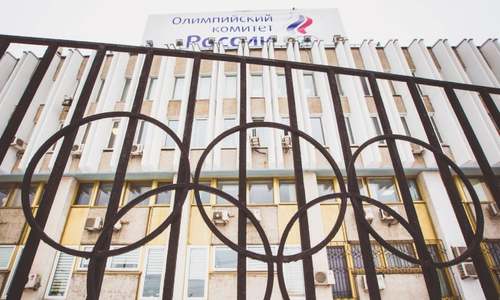
MOSCOW: Russia’s Olympic Committee agreed on Tuesday to support its athletes who choose to compete in next year’s Winter Games in South Korea as neutrals following a ban on the Russian national team.
The International Olympic Committee (IOC) last week banned Russia from the Games, due to take place in Pyeongchang in February, for what it called “unprecedented systematic manipulation” of the anti-doping system.
But it left the door open for Russian athletes with a clean history of non-doping to be invited to compete as neutrals under an Olympic flag, not a Russian one.
President Vladimir Putin said last week Russia would not prevent its athletes from competing, dismissing calls by some for a boycott, and an ROC official said on Monday most Russian athletes still wanted to attend.
The Russian committee (ROC) agreed its position at a meeting on Tuesday attended by sporting figures including the national men’s hockey team, figure skaters, speed skaters and the presidents of winter sports federations.
ROC president Alexander Zhukov said: “All the participants were of the same opinion -- our sportsmen need to go to Korea, need to compete, achieve victory for the glory of Russia, for the glory of our motherland.”
Zhukov said Russia would do its best to support Russian athletes competing under a neutral flag and hold serious talks with the IOC in the near future to discuss the problems and practicalities of the arrangement.
He did not say what form this support would take.
“Russian sportsmen have stated their readiness to take part in the Olympic Games, despite the difficult conditions and decision of the IOC, which is undoubtedly unfair in many ways,” he said.
Zhukov added that Russia would also support the athletes who had decided not to compete in Pyeongchang.
Senior Russian Olympic official Vitaly Smirnov, who heads Russia’s state-backed anti-doping commission, said the country had made the “right decision” not to boycott.
“A boycott is not a solution,” Smirnov said. “That [would mean] new sanctions and problems for our athletes.”
In the weeks leading up to the IOC ban, more than 20 Russian athletes who competed at the 2014 Sochi Games were banned for life from the Olympics for allegedly breaching anti-doping rules.
Russian authorities have vehemently denied any state support for doping and have pledged to co-operate with international sports bodies to counter the use of banned performance-enhancing drugs.
Russia’s athletics federation, paralympic committee and anti-doping agency RUSADA remain suspended over doping scandals.
“OLYMPIC ATHLETE FROM RUSSIA”
Sitting in the front row of the Russian Olympic Committee auditorium ahead of the meeting, hockey star Ilya Kovalchuk said he would not mind competing at the Games as an “Olympic Athlete from Russia,” the term the IOC uses to designate the Russians who will go to Pyeongchang.
“We are athletes from Russia, after all,” Kovalchuk told reporters. “They took the flag away but they can’t take away our honour and our conscience.”
Kovalchuk, one of the first to call for athletes to compete in Pyeongchang after the IOC ban, thanked authorities for taking the opinions of athletes into consideration.
“Thank you for having heard us, for having believed us,” Kovalchuk said. “I think that every athlete who takes part in the Olympic Games in Pyeonchang will do everything possible.”
Olympic fencer Sofya Velikaya, chair of the ROC’s athletes commission, called on the Russian public to respect athletes’ decisions to go to Pyeongchang amid concerns that some could be branded traitors for agreeing to compete without the country’s flag.
“The athletes will show their love for their motherland and their patriotism through their results, through their accomplishments and medals,” Velikaya said.
Published in Dawn, December 13th, 2017













































